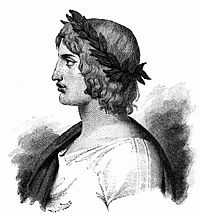Vergilius
| Virgil | |
|---|---|

Depiction of Virgil
|
|
| Born | Publius Vergilius Maro October 15, 70 BC Near Mantua, Cisalpine Gaul, Roman Republic (now Province of Mantua, Italy) |
| Died | September 21, 19 BC (age 50) Brundisium, Italy, Roman Empire (now Brindisi, Italy) |
| Occupation | Poet |
| Nationality | Roman |
| Genre | Epic poetry, didactic poetry, pastoral poetry |
| Literary movement | Augustan poetry |
Publius Vergilius Maro (Classical Latin: [ˈpuː.blɪ.ʊs wɛrˈɡɪ.lɪ.ʊs ˈma.roː]; traditional dates October 15, 70 BC – September 21, 19 BC), usually called Virgil or Vergil /ˈvɜːrdʒɪl/ in English, was an ancient Roman poet of the Augustan period. He wrote three of the most famous poems in Latin literature: the Eclogues (or Bucolics), the Georgics, and the epic Aeneid. A number of minor poems, collected in the Appendix Vergiliana, are sometimes attributed to him.
Virgil is traditionally ranked as one of Rome's greatest poets. His Aeneid has been considered the national epic of ancient Rome since the time of its composition. Modeled after Homer's Iliad and Odyssey, the Aeneid follows the Trojan refugee Aeneas as he struggles to fulfill his destiny and reach Italy, where his descendants Romulus and Remus were to found the city of Rome. Virgil's work has had wide and deep influence on Western literature, most notably Dante's Divine Comedy, in which Virgil appears as Dante's guide through Hell and Purgatory.
...
Wikipedia
